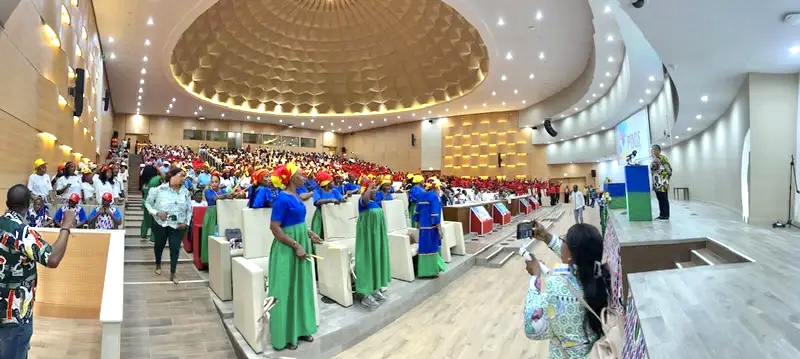The Grand Hotel Djibloho welcomes members of the Democratic Party of Equatorial Guinea (PDGE) on the national tour to present the new Secretary General of the PDGE.

The City of Peace, capital of Djibloho province, was the scene of a significant stop on June 16 and 17 as part of the National Presentation Tour of the new Secretary General of the PDGE, Mr. Faustino Ndong Esono Ayang, who arrived accompanied by his Deputy Secretaries General, heads of party departments, representatives of the PDGE Women's Group and ASHO, as well as local authorities from the district.
On this occasion, the Grand Hotel Djibloho hosted the delegation, offering not only its accommodations but also the organizational framework for all the activities of this day of direct contact with the activists and institutions of the region.
The Secretary General's arrival at the hotel was accompanied by a traditional cultural reception. The main event of the meeting was subsequently held in the conference room of the Grand Hotel Djibloho, with interventions by local authorities and party representatives.
During his remarks, Mr. Faustino Ndong Esono Ayang delivered the message of H.E. the President of the Republic, Teodoro Obiang Nguema Mbasogo, focusing on themes such as peace, the role of youth, unity, and current challenges. In his remarks, the Secretary-General emphasized the importance of instilling in the new generations a knowledge of the people's history to strengthen their commitment to the country and its future.
The President of the PDGE District Council in Djibloho welcomed the delegation, also pointing out that the province and its capital, the City of Peace, represent the result of a high political vision, the fruit of the work of the Founding President.
Beyond its role as a meeting point, the Grand Hotel Djibloho reaffirmed its role as a leading institutional space on this day, offering optimal conditions for accommodation, meetings, and the effective development of an event of this magnitude.
As part of this national tour, Djibloho's tenure is recorded not only as a key moment in strengthening contact between the party and its militant base, but also as an example of how the national infrastructure can support political processes with professionalism, capacity, and organizational excellence.
